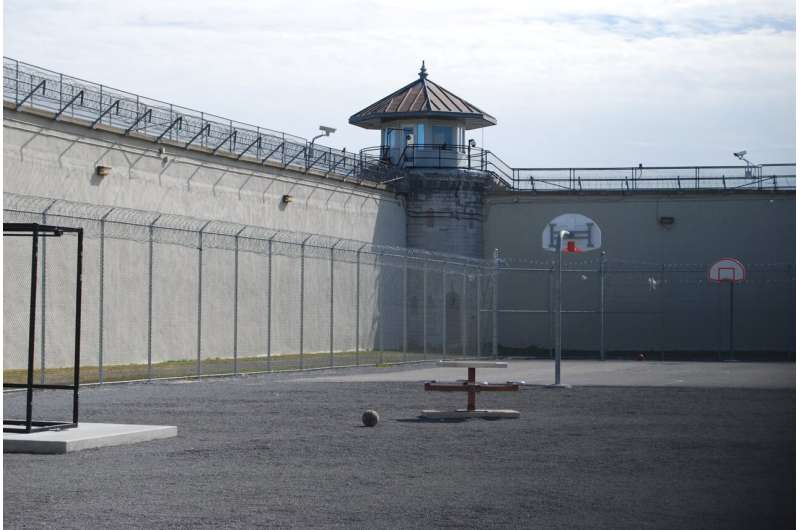Prison staff and inmates face unseen psychological wounds, experts warn

Overcrowded prisons in England and Wales are at breaking point, with self-harm at record levels. Now, researchers are sounding the alarm over a largely overlooked issue: moral injury, a psychological wound caused by witnessing or experiencing events that deeply conflict with a person's values.
Experts from the University of Bath, UCL, King's College London, Combat Stress, and NHS partners have a report in the European Journal of Psychotraumatology urging the UK government to provide targeted mental health support for prison staff and prisoners.
The call to action comes amid stark showing that self-harm in prisons in England and Wales has reached its highest levels since records began in 2004. His Majesty's Chief Inspector of Prisons, Charlie Taylor, of the devastating impact of overcrowding on prisoner well-being.
Recommendations for change
The researchers have outlined practical steps the UK government can take to tackle moral injury in prisons:
- Tailored mental health programs: Develop approaches that fit the limited resources available in prisons.
- Prevention strategies for staff: Introduce coping workshops, psychoeducation, and peer support networks to help staff manage stress.
- Enhanced role for chaplains: Train chaplains to support both staff and prisoners in dealing with moral injury.
- Creative therapies: Use group-based approaches like art or music therapy when one-on-one sessions aren't possible.
Call to action
Lead researcher Dr. Victoria Williamson from the Department of Psychology at the University of Bath said, "Our findings reveal a serious gap in mental health support for both prison staff and prisoners. This isn't just a personal issue for those affected—it's a systemic problem that requires urgent action. If we address moral injury, we can improve mental health, reduce reoffending, and help create a more resilient prison workforce. Supporting staff and prisoners with effective interventions isn't just ethical—it's vital for the health of the prison system and our society."
Professor Dominic Murphy, from Combat Stress & King's College London said, "While research in moral injury started within military populations, we know other groups are affected as well. The aim of this project is understand how we can use what we have learnt around the management of moral injury-related psychological distress to start to tackle these issues within staff working across the prison sector.
"We understand that the prison system is under intense resource pressure, but we believe that developing an intervention to support prison staff is worth the investment because it could reduce the significant mental health burden and also help to retain the workforce."
Andy Bell, Chief Executive of the Centre For Mental Health said, "Mental ill health is highly prevalent within the prison population, and prison staff are working in environments that put their well-being at risk too. Understanding the risk factors for poor mental health, such as moral injury, and taking steps to address them may help to address some of the causes and triggers of mental distress among people in the prison system."
Co-lead researcher Dr. Danielle Lamb said, "To address these problems we plan to talk to people working in prisons, and NHS staff who support them and prisoners, and co-design an intervention to support them. We've planned this project in collaboration with current and former prison staff to make sure we tackle the most pressing issues in the most effective ways."
What is moral injury?
Moral injury happens when people experience or witness events that clash with their core beliefs, leading to feelings of shame, guilt, or anger. Without the right support, this can develop into serious mental health problems.
While moral injury has been widely studied in professions like health care and the military, its impact on prison staff and prisoners has gone largely unrecognized—until now.
For prison staff, everyday duties can mean witnessing disturbing events like suicides or self-harm and being unable to intervene, or even using force against prisoners. This takes a heavy psychological toll, contributing to burnout and mental distress.
Prisoners are not immune either. Many struggle with deep guilt over their crimes—especially those committed under pressure or impaired judgment—adding another layer of emotional pain.
The overcrowded and understaffed prison system only makes matters worse. Rising violence, high staff turnover, and a lack of mental health resources leave both staff and prisoners vulnerable to repeated, morally injurious experiences.
Barriers to support
The study highlights several obstacles that make it difficult to address moral injury in prisons:
- Trauma-focused therapies may not work—or could even harm those experiencing moral injury.
- Prisoners often avoid seeking help because of stigma, mistrust of health care providers, or fear of incriminating themselves.
- Staff, already overstretched and burned out, often fail to access the help they need.
More information: Victoria Williamson et al, Experiences and impact of moral injury in prisons, European Journal of Psychotraumatology (2025).
Provided by University of Bath


















